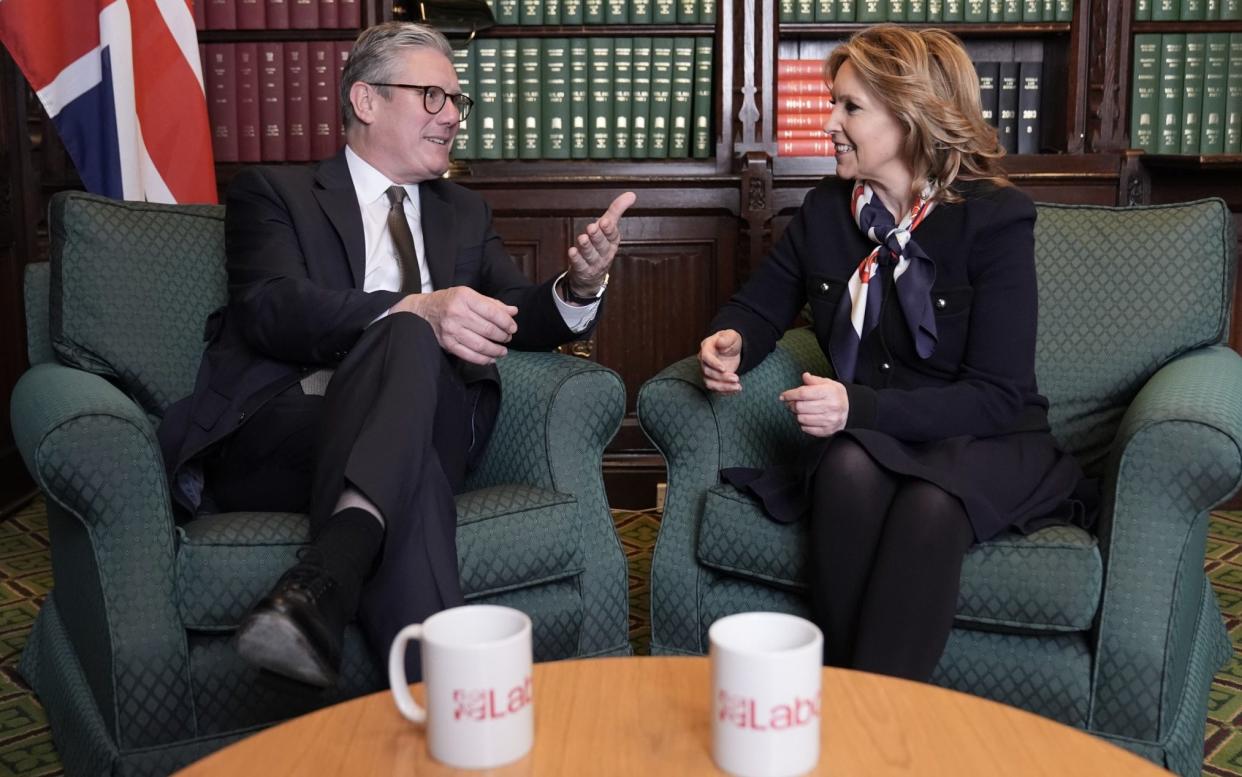Voters not in love with Starmer’s Labour party, warns Kinnock
Britain is not yet in love with Sir Keir Starmer’s Labour Party, Lord Kinnock has said, as party insiders fear that the general election could become a repeat of 1992.
The former Labour leader told BBC Radio Four’s Week in Westminster that it was “fair” to say that voters were not fully convinced by his party, and that it was not guaranteed it would win a House of Commons majority.
His point is echoed by Anneliese Dodds, the Labour Party chairman, in an interview with The Telegraph. She said: “We can be very good at losing elections people thought we would win. Think of 1992.”
It comes in a week where Sir Keir has had to justify why he allowed Tory MP Natalie Elphicke to defect to Labour, with the decision criticised by those on the Left of the party and female Labour MPs.
Yesterday, Rishi Sunak hailed the official end of a short recession by saying the economy now had “momentum”, with Number 10 believing the improvement helps the Conservatives’ re-election hopes.
Since an academic analysis of the local election results pointed to a hung parliament, there has been debate about whether Labour’s 20-point poll lead will translate into a majority.

Lord Kinnock was Labour leader in the run-up to the 1992 general election, when his party was widely expected to win, only for Sir John Major’s Tories to pull off a shock victory.
On the Week in Westminster, which is broadcast on Saturday, the Labour peer was asked if the truth of the current political dynamic was that the country was “deeply disillusioned with the Tories” but “not yet fully convinced or in love with the Labour pitch”.
Lord Kinnock responded: “I think that’s fair. And I think that it’s pretty natural after 14 years of continuous Conservative-led and Conservative governments.
“Expressing enthusiasm is different from expressing desperation. People will say ‘let’s get the bloody Tories out’, but they won’t say ‘Hurrah hurrah, marvellous, freedom, liberation is with us because of Keir Starmer.’ They are entirely different departments of human sentiment.”
He declined to say whether the run-up to this election felt more like 1992 or 1997, when New Labour was swept into power under Sir Tony Blair, saying no two elections were the same.
But Lord Kinnock did strike a note of caution when asked whether he thought the election result would be a Labour majority or a hung parliament, which is when no party has an overall majority.
He said: “I’m simply saying I don’t think we’ll lose. In fact, I think I can say with some certainty we’re not going to lose.
“When it comes to trying to guess the possibility of majorities – large, medium, small – I simply won’t engage in that because we’ve got a first-past-the-post system which can be very capricious.”
Labour insiders often point to the surprise defeat in 1992 to back up their argument that they must not be complacent, even with their vast opinion poll lead over the Tories.
Pat McFadden, Labour’s national campaign co-ordinator, who was an adviser in the Blair rebuild after 1992, has been reminding colleagues that not a single vote has yet been cast for the general election.
On Friday, Sir Keir tried to counter Tory attacks on his pledge to scrap the Rwanda deportation flights by announcing plans to create a new border security command and use terror laws to stop migrant boats crossing the Channel if he were to win office. Being seen as credible by the public on tackling immigration is one of the Labour Party’s biggest challenges.
Number 10 insiders hope that multiple Rwanda flights taking off over the summer and the improving economy will give them a chance of what Mr Sunak has said would be the “greatest comeback in political history”. The general election is expected in October or November.
Mr Sunak seized on the news that the recession was over on Friday, saying: “Confidence is returning to the economy and the country, and I hope that you’re starting to feel that too.”
In his interview, Lord Kinnock acknowledged Sir Keir and Sir Tony had differing political appeals, but argued that they both matched the specific public mood at the time.
Lord Kinnock said: “’97 was exceptional in many ways. This one is too. And frankly I actually think that Keir’s sobriety, his maturity, his steadiness, his dependability are really useful and essential features of the political landscape now.
“Because we’ve had – I think anybody would admit – giddy years in terms of political leadership and in terms of the swirl of economic and economic-related events. So what we’re looking for, what I think the country is looking for, is someone who will give, for want of a better phrase, the country a helmsman to be depended upon.”
In comments also made on the Week in Westminster but released earlier in the week, Lord Kinnock criticised the decision to allow Ms Elphicke to join Labour. He said: “I think we have got to be choosy to a degree about who we allow to join our party because it’s a very broad church but churches have walls and there are limits.
“Ms Elphicke has got to decide whether she is committed to the programme and principles of the Labour Party, broadly defined, generously defined with great liberal intentions, but we are a political party and not a debating club.”



